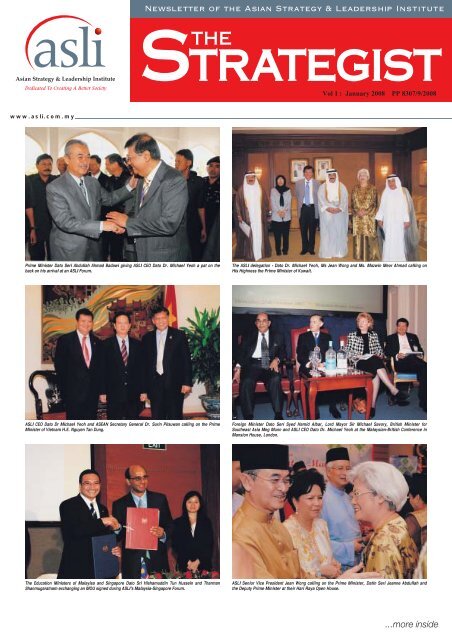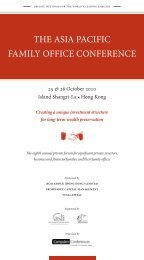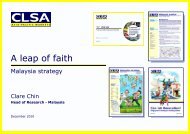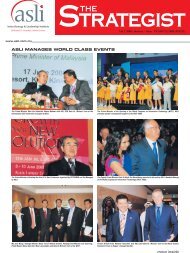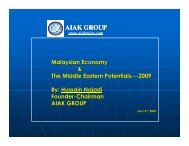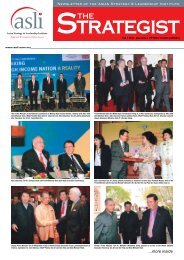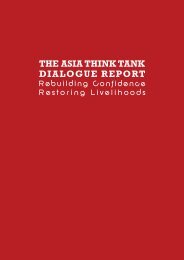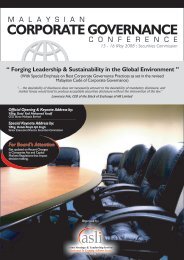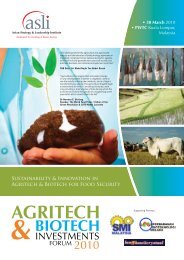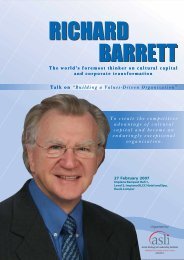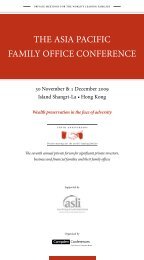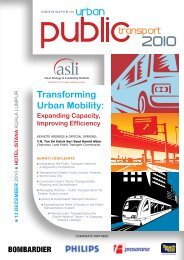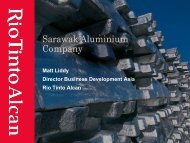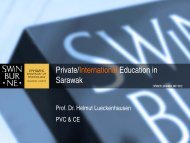Strategist Cover.eps - Asian Strategy & Leadership Institute
Strategist Cover.eps - Asian Strategy & Leadership Institute
Strategist Cover.eps - Asian Strategy & Leadership Institute
- No tags were found...
Create successful ePaper yourself
Turn your PDF publications into a flip-book with our unique Google optimized e-Paper software.
Vol 1 : January 2008 PP 8307/9/2008www.asli.com.myPrime Minister Dato Seri Abdullah Ahmad Badawi giving ASLI CEO Dato Dr. Michael Yeoh a pat on theback on his arrival at an ASLI Forum.The ASLI delegation - Dato Dr. Michael Yeoh, Ms Jean Wong and Ms. Mazwin Meor Ahmad calling onHis Highness the Prime Minister of Kuwait.ASLI CEO Dato Dr Michael Yeoh and ASEAN Secretary General Dr. Surin Pitsuwan calling on the PrimeMinister of Vietnam H.E. Nguyen Tan Dung.Foreign Minister Dato Seri Syed Hamid Albar, Lord Mayor Sir Michael Savory, British Minister forSoutheast Asia Meg Munn and ASLI CEO Dato Dr. Michael Yeoh at the Malaysian-British Conference inMansion House, London.The Education Ministers of Malayisa and Singapore Dato Sri Hishamuddin Tun Hussein and TharmanShanmugaratnam exchanging an MOU signed during ASLI's Malaysia-Singapore Forum.ASLI Senior Vice President Jean Wong calling on the Prime Minister, Datin Seri Jeanne Abdullah andthe Deputy Prime Minister at their Hari Raya Open House.
MALAYSIAN-BRITISH PARTNERSHIPMALAYSIAN-BRITISH PARTNERSHIPThe British Minister for Southeast Asia Meg Munn flanked by ASLI President Mirzan Mahathir and SeniorVice President Jean Wong.From left: Dato David Yeoh, Lord Levene, Sir Michael Savory, Dato Seri Syed Hamid Albar and Dato Dr.Michael Yeoh.Sir Richard Needham,Dato Azman Mokhtar, Mr. Martin Barrow and Dr. Gerald Lyons.Lord Levene Chairman of Lloyds, Dato Dr. Munir Majid, Sir Michael Savory, Tunku Abdul Aziz and LordGeorge.Second Finance Minister Tan Sri Nor Mohamad Yakcop with former British High Commissioner BruceCleghorn and HSBC's Dato Zarir Cama.Minister of Science, Technology & Innovation Dato Seri Dr. Jamaluddin Jarjis, the Lord Mayor ofLondon, Dato Dr. Michael Yeoh and Dato Dr. Munir Majid at the Malaysian-British Conference in London.Former Governor of Bank of England Lord George, Dato Vinod Sekhar and participants at the conference.Foreign Minister Dato Seri Syed Hamid Albar officiating the Cambridge-Malaysia Forum whilst Prof. SirDavid Bailey President St. Catharine's College, Cambridge University looks on.In conjunction with Malaysia’s Golden Jubilee, the <strong>Asian</strong> <strong>Strategy</strong> &<strong>Leadership</strong> <strong>Institute</strong> organized two important events in London. Theseprogrammes also marked the 50 years of bilateral relationship betweenMalaysia and Britain.The first event was the Commemorative Conference on 50 years ofMalaysia-British Partnership: Moving Forward on 25 October 2007.ASLI jointly organized this event with the British Malaysian Society andthe Asia House. The event also received the support of the MalaysianHigh Commission in London, the Commonwealth Business Council andthe British Foreign & Commonwealth Office. In view of the significanceof this event, the Lord Mayor of London offered his official residence, theMansion House as the venue of the conference.The one-day event was launched by Dato’ Seri Syed Hamid Albar,Malaysia’s Foreign Minister and was closed by Senator Tan Sri MohamedNor Yakcop, Malaysia’s 2nd Finance Minister. Malaysia’s Minister ofScience, Technology and Innovation, Dato Seri Dr Jamaluddin Jarjisdelivered the Special Luncheon Address. Other role players whocontributed to the event included the Hon. Meg Munn, the ParliamentaryUnder Secretary of State, Foreign and Commonwealth Office, Sir MichaelSavory, the Lord Mayor Locum Tenes, Dato Neville Green of BritishMalaysian Society, Lord Levene Chairman of Lloyd’s of London, LordGeorge of St Tudy former Governor Bank of England, Tunku Abdul AzizIbrahim, Dato Dr Mohd Munir Bin Majid Chairman of Malaysia Airlines,Tan Sri Radzi of Telekom, Mr Mark Tucker Group Chief Executive ofPrudential Plc, Prof Christine Ennew of University of Nottingham.The event attracted 150 delegates comprising both British and Malaysianparticipants and was supported by Petra Group, Kuala Lumpur Kepong,Genting Group, MUI Group, LimKokWing University of CreativeTechnology and Sri Indrajaya as well as HSBC bank as luncheon sponsor.Dato Seri Syed Hamid Albar said that, “the way forward for bothMalaysia and the UK lies in the synergy and motivation that we cangenerate in terms of finding new areas of trade, research andinnovation, the sharing of new technologies and establishing moreefficient and economic means of collaboration that can be mutuallybeneficial to both the Malaysian and the British people alike”.He pointed that, “Both Britain and Malaysia must be partners in theworld of ideas and concepts for global peace and security. Above all,there must be political will and commitment by the government to set thetone for meeting these new and dynamic challenges”.The British Minister for Southeast Asia spoke on the strength of tiesthat have bound the UK and Malaysia since independence. Sheelaborated on the strong education links, business and traderelationships and new areas of partnerships such as Islamic finance,climate change and sustainable development.The British Foreign & Commonwealth Office held a Special Receptionat the Locarno Suite of the FCO at King Charles Street. The receptionwas hosted by the Hon. Meg Munn, the Parliamentary UnderSecretary of State, Foreign and Commonwealth Office (OverseasTerritories, South East Asia, the Caribbean and Central America) andattended by approximately 200 guests.The programmes in London continued on the 26 October 2007 withthe Cambridge Malaysia Forum which was jointly organized betweenASLI, St Catharine’s College and Cambridge University MalaysiaSociety. This event was attended by approximately 80 people andwas supported by Khazanah Nasional. Both Dato’ Seri Syed HamidAlbar, Malaysia’s Foreign Minister and Senator Tan Sri Mohamed NorYakcop, Malaysia’s 2nd Finance Minister addressed the forum. TheForeign Minister in his Opening Keynote Address spoke on Malaysia’sforeign policy priorities whilst the 2nd Finance Minister spoke onMalaysia’s economic transformation. Other speakers included Prof.Sir Christopher Bayly, President of St. Catharine’s College, Dato DrMunir Majid of Malaysia Airlines, Datuk Vinod Sekhar of Petra Group,Mr Walter Herriot of St John’s Innovation Centre, Cambridge and DatoAzman Mokhtar of Khazanah Nasional.The Forum examined on Malaysia’s transformation into a knowledgebasedeconomy, its economic challenges and how Cambridge canassist in Malaysia’s development.Again, this event was to commemorate Malaysia’s 50 years ofindependence and the close relationship Cambridge has had withMalaysia prior to and after Malaysia’s independence. Significantly,Malaysia’s Father of Independence Tunku Abdul Rahman Putra wasan undergraduate and later an Honorary Fellow at St Catharine’sCollege.In conjunction with these commemorative events in Britain, ASLI alsopublished a Special Publication on the 50 years of British-Malaysianties. The Prime Minister wrote the Foreword in this Special Publicationwhere he commended ASLI for commemorating this landmark in thehistory of our bilateral relations. The Prime Minister wrote that bothcountries must continuously strive to explore new areas of cooperationand enter into novel forums of collaboration. “I believe this is thechallenge that both countries must meet in order to sustain theconfidence in our relationship and meet the aspirations that ourpeoples have for the future”, added Dato Seri Abdullah AhmadBadawi. The Prime Minister also felt that the long ties of history andthe strong partnerships of the present should be able to ensure anenduring friendship between Malaysia and UK long into the future.Tune Money CEO Tengku Zafrul and David Wong, Doctoral candidate at Cambridge University.Lord Levene Chairman of LIoyds London and Dato Dr. Munir Majid Chairman Malaysia Airlines.Dato Azman Mokhtar and Dato Dr. Michael Yeoh being introduced to Professor Dame Jean Thomas,Master, St.Catharines's College, University of Cambridge.Khazanah Nasional Managing Director Dato Azman Mokhtar and PETRA Group CEO Dato Vinod Sekhar atthe Cambridge Malaysia Forum organised by ASLI.45
ASLI EVENT MANAGED NAFAM CONVENTIONASLI EVENT MANAGED NAFAM CONVENTIONASLI's Director of Business Partnerships Mr. Max Say greeting the Prime Minister on his arrival.Dato' Seri Abdullah flanked by Dato' Yahya A. Jalil, Dato' Seri S.Samy Vellu and Dato' Ir. Dr Judin AbdulKarim during the Special Press Conference after the Opening Ceremony.Datuk Shahrir Abdul Samad, Chairman of Public Accounts Committee and Dato' Ir. Hamzah bin Hassanof CIDB Malaysia.Datuk Dell Akbar Khan of AMPM Sdn. Bhd. (Moderator) thanked Tan Sri Musa Hassan for hispresentation on Security & Safety Measures.presented with an array of topics ranging from Special Keynote: “NationalAsset & Facility Management Development”. Session 2: “The FutureTrend in Implementing An Effective Asset Management Initiative – theEuropean Experience”, Panel Discussion: “Critical Issues in ManagingGovernment’s Assets & Facilities in Malaysia”, Workshop 1: “Utilisation ofTechnology in Managing the Government’s Assets & Facilities”,Workshop 2: “Identification of Core Competencies for Asset & FacilitiesManagers”, Session 3: “Security & Safety Measures in Managing PublicBuildings and Facilities”, Session 4: “ Capacity Building & Sustainability inAsset & Facility Management”, Special Session: “Best Practices &Success Stories in Asset & Facility Management – Sharing ofExperiences”.Among those who contributed significantly to the convention include TanSri Mohd Sidek bin Hassan, Chief Secretary to the Government ofMalaysia; Datuk Nicholas S. Zefferys, Past President & Chairman,AmCham Malaysia; Dato Ir Haji Annies bin Md. Ariff, Head, MaintenanceSector, Public Works Department; Datuk Dr Sulaiman Mahbob, Director-General, Economic Planning Unit (EPU); Datuk Ir Dr M.S. Pillay, DeputyDirector-general of Health, Deputy Director-General of Health (TechnicalSupport), Ministry of Health; Tuan Haji Hanaffi bin Haji Ahmad, DeputyUnder-Secretary – Remuneration Policy, Public Money & Management,University of Salford, UK; Dato Ir. Hamzah bin Hassan, Chief Executive,Construction Industry Development Board; Datuk Shahrir Abdul Samad,Chairman, Public Accounts Committee (PAC); Encik Ruslan bin Nordin,Managing Director, Global Facilities Management Sdn Bhd; EncikMohamed Rafique Merican, CEO, Radicare (M) Sdn Bhd and Dato IrHasnur Rabiain Ismail, Executive Chairman, Protasco Berhad.Dato' Seri Ong Ka Ting, Tan Sri Dato' Muhyiddin Haji Mohd Yassin, Dato' Seri Haji Azmi Khalid andDato' Mohamed Khaled Nordin listening attentively to Dato' Seri Abdullah's Keynote Address.From left: Tan Sri Dr. Koh Tsu Koon, Dato Sri Hishamuddin Tun Hussein, Dato Dr. Awang Adek Hussin,Tan Sri Mohd Sidek Hassan and Dato Dr. Wan Aziz.2008 POST BUDGET PANEL DISCUSSIONLeading the call made by the Prime Minister to inculcate and nurture themaintenance culture as well as part of their initiatives in promoting andenhancing the professional standard of the Asset & Facility Managementin Malaysia, the Public Works Department of Malaysia (JKR) togetherwith the Advanced Maintenance Precision Management Sdn Bhd(AMPM) jointly organized the National Asset & Facility ManagementConvention (NAFAM) 2007 on 13 & 14 August 2007 at the Putra WorldTrade Centre. This convention was also organized in collaborationwith the Ministry of Works and the Prime Minister’s Office. The themeDato' Dr Chua Soi Lek with Dato' Seri Utama Haji Mohamad bin Haji Hasan.Datuk Dr Sulaiman Mahbob of EPU, Datuk Nicholas S. Zefferys and Tuan Haji Hanaffi bin Haji Ahmad ofthe Ministry of Finance during Session One.“Asset & Facility Management: Coping with Future Challenges” waschosen in view of its increasingly important role in effective managementof expanding asset bases. ASLI was appointed the Event Consultant tomanage the convention.The conference was officiated and closed by the Prime Minister ofMalaysia, Dato Seri Abdullah bin Haji Ahmad Badawi on Monday, 13August 2007 and Tuesday, 14 August 2007, respectively. Dato Ir JudinAbdul Karim, who was the Convention Organising Committee Chairmanand Director-General of the Public Works Department (JKR) Malaysia,delivered his Welcome Remarks while Dato Seri S.Samy Vellu, Ministerof Works, delivered his Welcome Speech during the Official OpeningCeremony.This inaugural convention, which was unprecedented in its candiddiscussions, was indeed a meeting of minds that deliberated at length onthe asset & facility management and has attracted more than 800participants including guests and media representatives to the OfficialOpening Ceremony. Amongst the participants at the convention wereMalaysia Cabinet Ministers, State Governments’ Menteri Besars andChief Ministers, Government-Linked Companies (GLCs), top governmentofficials, private sector companies, NGOs, relevant associations andorganizations.During the second day convention, ideas and recommendations on theasset & facility management were exchanged and delegates wereMs Jean Wong, Senior Vice President & COO, ASLI with Datuk Dr Tiki Lafe, Deputy Minister of Rural &Regional Development.The 2008 Post-Budget Panel Discussion was jointly organised by Persatuan EkonomiMalaysia, the <strong>Asian</strong> <strong>Strategy</strong> & <strong>Leadership</strong> <strong>Institute</strong> and the Faculty of Economics AndAdministration, Universiti of Malaya on the 10th September 2007, at Kuala LumpurHilton.Dato' Dr. Gan Khuan Poh introduced the members of the panel, thanking theGovernment and the Ministry of Finance for the Budget 2008 that had recently beenunveiled by the Prime Minister on the 7th September 2007. He commented that in orderto better the quality of life for the well-being of all citizens, it is necessary to transform theeconomy, increasing broadband rates in particular.Dato' Dr. Wan Abdul Aziz bin Wan Abdullah - Secretary-General of Treasury, Ministry ofFinance welcomed and thanked participants for attending the Post-Budget PanelDiscussion. He highlighted some topics that he would discuss at the meeting, includingthe 2007 Economic Performance and 2008 prospects, Federal Government financialposition, 2008 Budget allocation, and 2008 Budget theme and strategies. In his speech,he emphasised that the coming year's Budget is for the people of Malaysia, focusing onnational strengths from which the country can be subsequently built up.Some of thecurrent strengths we have as a nation today are high commodity prices, strengtheningsurplus in the current account of the balance of payment, high international reserves,strong banking system and capital market, high savings and ample liquidity, lowunemployment rate, a competitive Islamic financial system, and political stability.At the same time, some economic challenges are high crude oil prices, intensifyingprivate investment activities, a shortage of skilled labour force, global imbalances,moderating US economic growth, competition from developing economies, geopoliticaltensions as well as a high dependence on exports especially within the electrical andelectronics sector. He stressed that the second element needed in order to speed up theprocess towards becoming a developed nation is to stimulate private investment in thecountry.Reiterating this year's theme for the budget, which is "Together Building and SharingProsperity", he spoke about the three key areas that need to be focused upon. Theseare: corporate tax reduction, housing, and education. The corporate tax level needs to bereduced each year progressively. Secondly, there should be simplification of the taxsystem by means of the single tier system, which is related to profits at the companylevel. Education is an important emphasis in the Budget, where key elements have beendetermined. These are free education for all, an allocation of RM500 for each clusterschool, increasing the number of undergraduate students sponsored by the PubljcService Department, increasing the cost of living allowance for local and overseasstudents, and a tax relief of up to RM5000 for post-graduate fees. He stressed that mostimportantly, the key is to continually transform the Malaysia economy. Developing theeconomy and integrating ourselves wiih regional and International networks is the wayforward towards globalisation.Dato' Dr. Gan Khuan Poh, President of PEM, chaired the dialogue session that followed.Prof, Dr. Norma Mansor, Dean of the Faculty of Economics & Administration UniversityMalaya took note of the fact that the National Budget 2008 emphasised continuousgrowth. She acknowledged with pleasure the Government's plan to distribute RM30billion to schools for the disabled. In addition, introducing Chinese language in nationalschools will continue to encourage parents to send their children there, a positive signtowards national integration.She stated, however, that the most important thing is to increase the standard ofeducation and this applies to both schools and universities. For example, theGovernment needs to concentrate upon development of students through a number orways. She applauded the move to increase the cost of living allowance, as Malaysianstudents living abroad cannot possibly afford to pay all costs. This investment is positive,as they will be needed to improve the nation in the long run.Some points to be noted for future action are attracting foreign workers from abroad toMalaysia, as well as improvement on the public transportation system. These issuesneed to be urgently addressed.Prof. Dr. Mahani Zainal Abidin - Director-General, <strong>Institute</strong> of Strategic & InternationalStudies, Malaysia (ISIS) congratulated the Ministry of Finance and the Government for its2008 Budget. She brought up some key points of discussion, namely stressing uponhuman capital development and education, secondly encouraging the private sector tojoin in partnership with the Government in national development. The manufacturingsector used to be the primary source of growth, which is however increasingly decliningin Malaysia. There is a need to urgently restructure the manufacturing sector by lookingat the best practices from other countries. There is also a need to reform the Civil ServiceMalaysia needs to start seeing and observing improvement of the Civil Service, reformsof which have begun.Tan Sri Datuk Yong Poh Kon - President, Federation of Malaysian Manufacturers (FMM)spoke emphatically that the manufacturing sector has seen a smaller percentage growthin the last few years. The four tax systems that Malaysia currently has are corporate,single tier, top marginal and personal tax. Tan Sri Yong compared personal tax rates inMalaysia and Singapore, which was necessary because skilled employees are highlymobile people who will make their job decisions based on such comparisons.Singapore's tax rates seem to be more attractive at all salary levels, and hence Malaysianeeds to look into comparative taxation analysis. To solve the teacher problem, herecommended that retired teachers are rehired into the education system.Moving forward, Tan Sri Yong stated that there is an urgent need to improvemanufacturing efficiency by controlling rising costs and increasing investments ininnovations. On another note, improvements to the public sector have been maderecently. For example, contracts for KSU's have been extended to three years at a time.Transparency and integrity are key concepts to be emphasised, demonstrated andpractised. Finally, there have been positive moves within the immigration, customs andIRB departments which are indicative of public delivery system improvements. Interactionwith the floor allowed several comments and questions, to which the panellists responded.The Post-Budget Panel Discussion 2008 was successful in bringing together keymembers of the economy and industry to deliberate upon important issues that wouldaffect them in the coming year ahead. Participants had the opportunity of interactingespecially with representatives from the Treasury, Ministry of Finance in querying aftercontents of the Budget 2008 that had just several days earlier been tabled at Parliamentand thereafter released to the public.67
EVENTS ROUND UPEVENTS ROUND UPMalaysian High Commissioner to UK Dato Abdul Aziz with Foreign Minister Dato Seri Syed Hamid Albarand British Minister for Southeast Asia Meg Munn, at ASLI's Forum in London.Dato Dr. Michael Yeoh presenting a memento to Human Resources Minister Dato Dr. Fong Chan Onnwhilst Puan Sri Susan Cheah looks on.ASLI CEO Dato Dr Michael Yeoh greeting the Prime Minister whilst Tan Sri Dr Koh Tsu Koon, Tun Dr LimChong Eu and Dato Seri Ong Ka Ting look on.Dato Razman Hashim, Tan Sri Ramon Navaratnam, Dato P. Kasi, Pakistan High Commissioner andREHDA President Ng Seng Liong.At the Mansion House London: Dato Zarir Cama, Dato Azman Mokhtar, Dato Sri Dr. Jamaluddin Jarjisand Dato Neville Green.ASLI President Mirzan Mahathir, Second Finance Minister Tan Sri Nor Mohamad Yakcop, Ms Jean Wongand the Minister’s Aides, at Cambridge University.Dato Dr Michael Yeoh having a word with Tun Hanif Omar.En Ali Munawar Zakaria, Director of Marketing, IBM Malaysia Sdn Bhd, Datuk Peter Chin, Minister ofPlantation Industries & Commodities; Tan Sri Rainer Althoff, President/CEO, Siemens Malaysia Sdn Bhd;Puan Sri Susan Cheah, Director of ASLI.Second Finance Minister Tan Sri Nor Mohamad Yakcop addressing the Cambridge-Malaysia Forumorganized by ASLI.The ASLI team at St Catharine’s College, Cambridge University.From left to right: Dato Seri Kee Yong Wee, Mr Steven Fung, Mr Michael Oh.From left to right: Datuk Ir Md Sidek Ahmad of Tenaga Nasional Berhad; Tan Sri Amar Leo Moggie, Chairman ofTenaga Nasional Berhad, Ms Loo Took Gee, Deputy Secretary General, Ministry of Energy Water & Communication,Mr Chan Thye Seng, CEO of Pacific & Orient Bhd, and Tan Sri Ramon Navaratnam, Director of ASLI.Ms Jean Wong, Tan Sri Dr. Koh Tsu Koon, Tan Sri Ramon Navaratnam, Dato Dr. Michael Yeoh.Berjaya Group Chairman Tan Sri Vincent Tan and Berjaya Land CEO Dato Francis Ng at the VietnamInvestment Seminar organised by ASLI in Hanoi.Dato Dr. Michael Yeoh, Ms Jean Wong, Dato Badlisham Ghazali and Johor Menteri Besar Dato AbdulGhani Othman.Tan Sri H.M.Khatib, Dato Professor Joseph Adaikalam and Puan Sri Susan Cheah.Mr Max Say having a word with Deputy MITI Minister Ng Lip Yong and Malaysia Book of Records CEODatuk Danny Ooi.16The Ambassador of Finland and Tan Sri Abdul Halim Ali, Chairman Multimedia Development Corporation.Mr Charon Mokhzani Deputy Chief Executive, CIMB Investment Bank Berhad addressing the conferenceand on the right Mr Loong Caesar, Chief Executive Partner of Raslan Loong at the Mergers & AcquisitionsConference.17Mr Rajan Moses, Executive Editor of Business Times and Ms Millicent Danker, Founder & CEO ofPerception Management International Group of Companies at the M&A Conference.
THE 12 THMALAYSIAN CAPITAL MARKET SUMMIT 2007THE 12 THMALAYSIAN CAPITAL MARKET SUMMIT 2007Tan Sri (Dr) Ramon Navaratnam, Chairman of ASLI’s Center for Public Policy Studies receiving theChairman of Securities Commission Dato’ Zarinah Anwar upon her arrival at the summit whilst Ms JeanWong and Mr Max Say look on.Dato’ Haji Dusuki Ahmad, Chairman of Amanah Raya Berhad presenting a memento to Dato Dr AwangAdek Hussin, Deputy Minister of Finance II, looking on is Dato Dr Michael Yeoh, CEO of ASLI.Dato' Dr. Gan Khuan Poh, President of Malaysian Economic Association speaking at the summit with panelspeakers Mr. Joseph Tan, Senior <strong>Strategist</strong> Fortis Bank Singapore (on his left); and Mr. Michael Kurtz, SeniorManaging Director, Bear Stearns & Co. (on his right). The session is chaired by Tan Sri (Dr) Ramon Navaratnam.Mr. Johan Abdullah, Head of Listing Bursa Malaysia chairing a session with panel speakers Mr. ChanSay Yeong, CEO, Quill Capita Management (on his left) and Mr. Stewart LaBrooy, Chief OperatingOfficer, Axis REIT Managers.Tan Sri (Dr) Ramon Navaratnam presenting a memento to Tun Mohamed Dzaiddin Abdullah, Chairman ofBursa Malaysia.Dato' Zarinah Anwar presenting a memento to Datin Alicia Tiah, Chairman of TA Enterprise as CorporateSponsor of the summit.From left to right: Mr. Teoh Kok Lin, Founder/Chief Investment Officer, Singular Asset Management; Mr.Raymond Tang, Chief Investment Officer, CIMB-Principal Asset Management and Mr. Michael Tan, CEO,RHB Unit Trust Management.Dato' Mohd Salleh Abdul Majid, former President of KLSE having a session with panel speakers Mr. JohnZinkin, CEO, Securities Industry Development Corporation (on his left) and Mr. Anthony Dass, Head ofResearch, Inter-Pacific Research.ASLI organised its Annual Malaysian Capital Market Summit, the 12th inthis Annual series on 13th and 14th November 2007. The theme for thisyear's summit was "Powering the Malaysian Market to New Heights".The Chairman of the Securities Commission Malaysia Dato' Zarinah Anwardelivered the Opening Keynote Address at the summit. In her speech, shementioned that a key element of a competitive capital market is a strongcorporate governance framework. This should come through increasingaccountability of industry, professionals and PLCs for ethical conduct.They must inculcate strong internal compliance and corporate governanceculture.The window of opportunity is opening with the re-alignment of globalbusiness - with petrodollars and growth shifting momentum to Asia, many<strong>Asian</strong> countries are accumulating huge surpluses of savings that need tobe invested into a diversified basket of assets. The challenge ahead for all<strong>Asian</strong> markets is how we are to go about building bridges between ourcurrently fragmented pools of liquidity, how we can facilitate active tradingacross different time zones and how we can channel our wealth intoeconomic growth and prosperity. In this regard, it is important for <strong>Asian</strong>markets and firms to promote greater collaboration to maximize crossbordervalue generation and growth. Malaysia must therefore look foropportunities to tap regional liquidity to create an exciting andinternationally-oriented corporate and market landscape and to expand theDato' Zarinah Anwar presenting a memento to Datuk Ali Abdul Kadir, CEO of Dubai Investment Group asCorporate Sponsor of the summit.scale of Malaysia's capital markets, said Dato' Zarinah Anwar.The Deputy Finance Minister Dato' Dr. Awang Adek Hussin delivered theSpecial Keynote Address at the summit. Dato' Awang reminded all thatcapital market in particular stock market is a financial assets market asopposed to goods or commodities markets. While the prices of goods andcommodities are determined by supply and demand, the prices of financialassets such as shares or stocks are largely determined by expectations.For instance, the shares of a particular counter may not change hand verymuch on a particular day as the flow or transactions may be only few lots,but the price may have gone up substantially if players in the market havebuilt in the expectations for whatever reasons, that this counter orcompany is going to worth more in the future. We should not allow ourmarket to become a casino for unscrupulous stock manipulators to play upprices on particular counters. Stock manipulations is unhealthy. However,stock speculation that creates genuine interest to maintain healthy growthin the market is allowable and is healthy for the long term growth of themarket. Hence, securities borrowing and lending or regular short sellingneed not be harmful to the market but instead can create interest andexcitement in the market, said Dato' Awang Adek Hussin.Tun Mohamed Dzaiddin Abdullah, Chairman of Bursa Malaysia Berhaddelivered the Special Luncheon Keynote Address. He said that theMalaysian market has achieved a reasonable market capitalization,Tan Sri (Dr) Ramon Navaratnam having a light moment with Dato' Dr. Awang Adek Hussin, DatukMohamed Azahari and Dato' Dr. Michael Yeoh.From left to right: Dato' Amin Rafie Othman, Managing Director, Dubai Investment Group; Dato'Vaseehar Hassan; Mr. Badlisyah Abdul Ghani and Datuk Mohamed Azahari Mohamed Kamil, ManagingDirector, Amanah Raya-JMF Asset Management.turnover, liquidity, and new offerings. In the past decade since the <strong>Asian</strong>financial crisis in 1997, the KLCI has increased from 594 points in 1997 toan all time high of 1,412 points on 30th October 2007. Likewise, ourmarket capitalization had risen from RM375 billion to RM984 billion withincreased number of listed companies from 708 to 1,003. As a proxy to themarket, Bursa Malaysia Berhad has also experienced a dramatic increasein share price since its demutualisation and subsequent listing on the MainBoard from RM3.00 in March 2005 to RM14.70 as at 9th November 2007,representing an increase of almost 400%. Its market capitalization followedsuit, from RM750 million in March 2005 to RM7.7 billion as at 9thNovember 2007, representing an increase of more than 10 times. Tunfurther said that Malaysia need to forge ahead to move with speed inexecution and excellence in implementation. We have room to protect ourleadership in Islamic products and our strong Palm Oil commodity. Wemust capitalize on showcasing our PLCs with strong corporategovernance. We must ensure investor confidence through market integrity.Some of the distinguished role-players who addressed this high-levelsummit are Mr. Michael Kurtz. Senior Managing Director, Bear Stearns &Co; Dato' Dr. Gan Khuan Poh, President, Malaysian EconomicAssociation; Mr. Gan Kim Khoon, Director of Equity Capital Markets, OSKInvestment Bank; Dr. Tan Chong Koay, Founder/Chief <strong>Strategist</strong>, PheimAsset Management, Mr. Raymond Tang, Chief Investment Officer, CIMB-Principal Asset Management. Mr. Badlisyah Abdul Ghani, CEO, CIMBIslamic Bank; Mr, Faisal Alshowaikh, CEO of <strong>Asian</strong> Finance Bank; Dato'From left to right: Mr. Badlisyah Abdul Ghani, CEO of CIMB Islamic Bank; Mr. Faisal Alshowaikh, CEO of <strong>Asian</strong>Finance Bank; Dato' Vaseehar Hassan, CEO of Dallah AlBaraka Group and Chairman of RHB Islamic Bank; Mr. WanAsmadi Wan Ahmad, Executive Vice President & Head, Islamic Capital Markets, Aseambankers Malaysia Berhad.Vaseehar Hassan, CEO of Dallah AlBaraka Group; Dato' Amin RafieOthman, Managing Director, Dubai Investment Group; Datuk MohamedAzahari Kamil, Managing Director, Amanah Raya-JMF AssetManagement; Mr. Tay Kay Luan, Director, ASEAN & Australasia, ACCA;Mr. Abdul Wahab Jaafar Sidek, CEO, Minority Shareholder WatchdogGroup; Dato' Shahran Laili, CEO, Malaysian <strong>Institute</strong> of CorporateGovernance, Ms. Selvarany Rasiah, Chief Legal Officer, Bursa Malaysia,amongst others.Topics discussed were on 10 years after the financial crisis - what have welearnt, what drives the Malaysian market - economic outlook and marketchallenges, fund managers roundtable - challenges and opportunities ininvesting in Bursa Malaysia, islamic capital markets - growing Islamicfunds, sukuk and structured products and takaful, attracting middle-eastinvestments to the Malaysian market, strengthening shareholder activismand improving investor relations, addressing the human capital needs ofthe Malaysian capital market, development of REIT market in Malaysia -future trends, issues and opportunities and promoting cross listings andlistings of foreign companies in Bursa Malaysia: the road ahead.The summit was supported by the Securities Commission Malaysia andBursa Malaysia Berhad, with sponsorships from the AmanahRayaInvestment Bank, TA Securities, Dubai Investment Group and Inter-PacificSecurities Berhad. About 200 delegates attended this high-level annualevent.1819
MALAYSIAN BANKING SUMMIT 2007MALAYSIAN BANKING SUMMIT 2007Dato Zamani Deputy Governor Bank Negara arriving at the Banking Summit accompanied by ASLIPresident Mirzan Mahathir and Senior Vice President Jean Wong.Dato Zamani greeting RHB Islamic Bank Chairman Dato Vaseehar Hassan whilst Dato Nazir Razak lookson.Mrs. Irene Dorner CEO HSBC Bank, Mrs. Yvonne Chia CEO Hong Leong Bank, the Managing Director ofAmBank, Encik Mohd Azmi.Mr. Ashraf Ali Abdul Kadir (Maybank) Dato Michael Yeoh (ASLI) Ms. Moey Tan (Hong Leong Bank) Mr.Peter England (CIMB).Dato Vaseehar Hassan, Mrs. Yvonne Chia, Managing Director/CEO Hong Leong Bank and Mr. RaymondYeoh, Deutche Bank CEO at the Banking Summit.ASLI President Mirzan Mahathir presenting a memento to Irene Dorner CEO HSBC Bank Malaysia.Dato Seri Hamidy Hafidz and Prof. Bala Shanmugham.A panel discussion at the Banking Summit, with Mr. Alan Parker of Hewitt <strong>Leadership</strong> speakers.The Malaysian Banking Summit 2007 was held from 19 - 20 July 2007 withthe theme "Reinventing and Transforming Banks to Stay Competitive" atthe Hotel Nikko Kuala Lumpur.The Opening Keynote Address was read out by the Deputy Governor ofBank Negara Malaysia, Datuk Zamani Abdul Ghani on behalf of theGovernor, Tan Sri Dr Zeti Akhtar Aziz.In her keynote address, the Governor said that the Malaysian bankingsector has been significantly transformed and reinvented. Therestructuring, consolidation and rationalization efforts that were undertakenin the banking sector have placed the financial sector on a strongerfoundation. Financial reforms have also changed the environment.Progressive deregulation and liberalization have increased the flexibility tofinancial institutions. The introduction of capital market intermediaries,investment banks, an increasing presence of new international players inIslamic finance and more developed bond market, has resulted in asignificantly more diversified financial system.It was also pointed out that the financial sector has evolved from being anenabler of growth to become an important source of growth in its own right.The banking and insurance industries, now provides employment to morethan 123,000 Malaysians. Despite conditions that have remainedchallenging for a large part of the decade, the banking system remainedconsistently on solid financial ground with a risk-weighted capital ratio ofover 13%, low NPL ratios and continued profitability for 8 consecutiveyears. Such consumer lending has increased from RM134 billion toRM343 billion while loans disbursed to small and medium enterprises haveincreased from RM71 billion in 2000 to RM108 billion in 2007. Domesticbanking institutions are also building on their strong domestic performanceto expand beyond Malaysian borders. Today, 6 domestic banks havepresence in 10 countries around the region.In looking at the future terrain of the financial sector in Malaysia, 6 trendsare important:(1) the changing configuration of the global economy and global financialmarkets;(2) regional economic and financial integration;(3) financial sector development amidst increased liberalization in the<strong>Asian</strong> region;(4) increased role of domestic demand in the <strong>Asian</strong> economies;(5) growing significance of Islamic finance in the international financialsystem; and(6) developments in the regulatory structures and approaches.It can be expected that all these trends will have a significant bearing onthe future of the banking industry.The leadership of the banking industry will be instrumental in charting thefuture growth path and cultivating a performance culture that will steerfinancial institutions towards continued success. The challenge for bankinginstitutions is in being able to balance between demands of theintermediate terms with a longer term outlook and how this would feed intothe organisation's continuous renewal and transformation process.Our banking industry has seen many positive developments over the lastfew years. In order to keep this momentum going, the banking industrymust constantly innovate and re-invent itself to maintain itscompetitiveness. The landscape of the Malaysian banking industry hasbeen greatly transformed by the Financial Master Plan. The plan, launchedin 2001, has not only created a strong foundation for our banks andfinancial institutions but has also provided that critical momentum for theemergence of new growth areas such as wealth management, investmentlinkedproducts and unit trusts. On the other hand, Bank Negara and thebanks themselves are actively promoting Islamic banking not only inMalaysia but also in the global market. With a strong Islamic bankingfoundation, Malaysia has the potential to emerge as a hub for Islamicbanking in the world in the near future.A line-up of prominent speakers and experts addressed the Summitincluded Dato' Nazir Razak, Group CEO of CIMB Group; Mrs Irene Dorner,CEO of HSBC Bank Malaysia Bhd; Mrs Yvonne Chia, Group MD of HongLeong Bank; Mr Raymond Yeoh, CEO of Deutsche Bank; Dato' VaseeharHassan of RHB Islamic Bank; Mr Ashraf Ali Abdul Kadir, Executive Vice-President of Maybank; Ms Moey Tan, Chief Operating Officer of HongLeong Bank; Mr Peter England, Head of Retail Banking of CIMB Bank;Dato' Sri Abdul Hamidy Abdul Hafiz, CEO of Affin Bank; Mr MarcWittmann, Head of Analytical Banking, SAP Asia-Pacific Japan; Prof. BalaShanmugam, Director-Banking & Finance Unit, Monash University; DrJoseph Eby Ruin, Principal of RiskFirst Consultancy & Training, Dato K.Salman Younis, MD of Kuwait Finance; Mr Khalid Mahmood Bhaimia, MDof Hong Leong Islamic Bank; Mr Ahmad Zaini Othman, CEO of AmIsIamicBank; Prof. Dr Malik Muhammad Mahmud AI-Awan, Chief AcademicOfficer of INCEIF; Mr Alan Parker, Country Manager of Hewitt Associates;Puan Norhanifah A. Jalil, Head-Group Organisational Development ofAmBank Group; Mr Shuan Ghaidan, Head of Product & Delivery,Mastercard Worldwide; Mr Albert Tay, Director-SOA Asean of Oracle AsiaPacific; Mr David Hovenden, Vice President, A.T. Kearney Inc., Mr ChuHong Keong, Chief Information Officer of HSBC Bank; Mr Alex Lim, SeniorVice-President of Siemens Malaysia; Ms Gloria Goh, Partner-FinancialServices Practices of Ernst & Young; and Ms Chrisanne Chin, Consultantof Francorp Malaysia.The main sponsor for the Summit was RHB Islamic Bank Bhd while theCorporate Sponsors were AmBank Group, CIMB Group, Hong LeongBank Bhd, HSBC Bank Malaysia Bhd, Mastercard Worldwide and SAP.The co-sponsors were Siemens and Oracle. More than 150 participantsattended this two-day Summit, an annual series of Banking Summits whichASLI had organized over the years.CIMB CEO Dato Nazir Razak receiving a memento from Mr. Mirzan Mahathir.The Sponsors at the Banking Summit.MICCI President Mike Krishnan, Mr. Philip Koh, Dato Nazir Razak.Dato Salman Younis CEO Kuwait Finance House with En Ahmad Zaini Othman and Mr. Khalid Mahmood Bhaimia.2021
INFRASTRUCTURE DEVELOPMENT& FINANCING CONFERENCECORPORATE RESPONSIBILITY& CLIMATE CHANGEPuan Sri Susan Cheah, Director of ASLI presenting a memento to Dato'Seri S Samy Vellu, Minister ofWorks Malaysia while Dato' Dr. Michael Yeoh looks on.Dato' Tan Kia Loke of Sunway, a hotel staff and Cik Shaireen Abdul Waris Programme Director of ASLIreceiving Dato' Seri S Samy Vellu at the hotel lobby.Datuk Peter Chin welcomed by Ms. Eswari Kalugasalam of ASLI as Puan Sri Susan Cheah looks on.Tan Sri Dr. Ramon V. Navaratnam, Director ASLI with Datuk Suboh Bin Mohd Yassin, Secretary Generalof the Ministry of Natural Resources & Environment.Mr. HK Yong, Director of PPP Resources & Advisory Centre Sdn. Bhd. Mr. Zain Bador, Associate Directorof Babcock & Brown Asia Pacific and Puan Sariah Abd Karib, Senior General Manager of CIDB during theQ&A session.Datuk Nicholas S. Zefferys, President & Chief Executive Officer, Applied Consulting & Engineering Sdn. Bhd. / ImmediatePast President, AMCHAM introducing his panel speakers, Mr. Hamid Abdullah, Partner of Lee Hishammuddin Allen &Gledhill and Mr. Soo Seohan, Director & Head of Debt Capital Market of Aminvestment Bank Berhad.The Diplomatic Roundtable: HE. Ashok K. Kantha, High Commissioner (India) HE. Penny Williams HighCommissioner (Australia) Tan Sri Dr. Ramon Navaratnam Mr. Bo Monsted, Deputy/ Charge Affaires,Royal Danish Embassy.Ms. Ingeborg McNicoll, Partner Environmental Resources Management Sdn. Bhd. flanked by Mr. AliMunawar, Tan Sri Rainer Athoff, Ms. Chen Wei Nee, Technical Advisor, Strategic Communications PusatTenaga Malaysia on far left.It is undeniable that Asia's infrastructure needs are enormous. Whilst <strong>Asian</strong>economies are riding on an all-time high, the rate at which infrastructuredevelopment is keeping up is far lagging behind. Governments, faced with amounting pressure to sustain and finance infrastructure developments, are leftwith little choice but to increasingly turn to the private sector for financing inputs viapublic private partnerships and key strategic alliances. Yet, due to the presence ofsovereign and credit risks in Asia, both banks and investors are also adopting anextremely cautious attitude towards lending long-term for infrastructure projects.With that in mind the <strong>Asian</strong> <strong>Strategy</strong> and <strong>Leadership</strong> <strong>Institute</strong> was proud topresent the Infrastructure Development & Financing Conference on the 5-6November 2007 at the One World Hotel, Bandar Utama, Selangor. Theconference was specifically designed to assist institutional investors to determinetheir best-fit infrastructure investment option and to investigate the risk factorsattached to this kind of investment. In addition the conference was also a platformfor infrastructure fund managers to present their investment opportunities and forinfrastructure agencies and financiers to source new investment partners. Theevent was officiated by Dato' Seri S Samy Vellu, Minister of Works Malaysia.In his speech, Dato' Seri S Samy Vellu stated that Malaysia's privatization projectshave started over twenty years ago and it has put this nation on the map as a neweconomic force to reckon with. He also added that with the latest 9th Malaysia Plan,Malaysia will continue to build its economy and it will be with more refined strategiesand well-thought execution plan. Providing good living conditions is a promise thatthe government has made to the rakyat (people). Delivering what the governmenthave promised to be implemented through PPP means delivering solutions that fundnew roads, improve public transportations, modernized hospitals, and build newschools and social housing, more quickly and efficiently, so that together we canclose the service and infrastructure gap that currently exist in Malaysia.Infrastructure is one of the fastest growing asset classes in the world, with many investorsseeking exposure to long-term sustainable assets, capable of providing absolute returnsunder most market conditions. Because infrastructure has a low correlation to other assetclasses, it allows for better diversification of an investment portfolio.Among the distinguished role-players who spoke at the conference were Zain Bador,Associate Director, Babcock & Brown Asia Pacific; H K Yong, Director, PPPResources & Advisory Centre Sdn Bhd; Puan Sariah binti Abd Karib, Senior GeneralManager, Construction Industry Development Board (CIDB); Datuk Nicholas S.Zefferys, President & Chief Executive Officer, Applied Consulting & Engineering SdnBhd / Immediate Past President, AMCHAM; Soo Seohan, Director/Head, DebtCapital Market, AmInvestment Bank Berhad; Hamdi Abdullah, Partner, LeeHishammuddin Allen & Gledhill; Datuk Ir (Dr) Mohd Annas Mohd Nor, FormerChairman, Energy Commission / Special Advisor - International Business, GentingPower Holdings Limited; Faizal Othman, General Manager, Corporate BusinessDevelopment, Ranhill Utilities Bhd; Abdul Wahab bin Jaafar Sidek, Chief ExecutiveOfficer, Minority Shareholder Watchdog Group; Andri Aidham Badri, Partner, KadirAndri & Partners; Shadaitul binti Mohd Zain, Director, Wealth Strategies Consultant;Rein Westra, CEO / Executive Director, Rangkaian Pengangkutan Integrasi Deras(RAPID KL); Ahmad Mochtar Hashim, Vice President/Head, Business Development& Advisory - Infrastructure, Bank Pembangunan Malaysia Berhad and PatrickDocherty, Senior Advisor, KPMG Singapore.Climate change is now regarded as the most important social andenvironmental issue confronting society. If left unchecked, theconsequences are too great to fathom. More companies in Malaysia areacknowledging the negative impact of climate change and have adoptedvarious CSR initiatives in combating this.This inaugural National Conference on CSR and the Business of ClimateChange 2007 held in Nikko Hotel on 25 and 26 September 2007, wastimely and presented a platform to share and learn from initiatives, effortsand insights by various corporations and entities, particularly howbusinesses can contribute positively towards efforts to reduce globalwarming. The event brought together about 100 corporate philanthropists,NGOs, local and foreign senior government officials and leadingprofessionals to discuss key issues and debate solutions in going forward.Datuk Suboh Bin. Mohd Yassin, Secretary General, Ministry of NaturalResources and Environment, officiated the event on behalf of the Minister,Dato' Seri Azmi Khalid. Among the distinguished lineup of speakers wereHE Penny Williams, Australian High Commissioner; H.E. Ashok K. Kantha,Indian High Commissioner; Mr Bo Monsted, Deputy/Charge d'Affaires,Royal Danish Embassy; Tan Sri Dr Ramon V, Navaratnam, Director, ASLI;Mr John Zinkin, Deputy Chairman, <strong>Institute</strong> of Corporate SocialResponsibility Malaysia; Dato' Johan Raslan, Executive Chairman,PricewaterhouseCoopers; Datuk Peter Chin, Minister of PlantationIndustries and Commodities; Tan Sri Rainer Althoff President & CEO,Siemens Malaysia Sdn Bhd; En Ali Munawar bin Zakaria,Director ofMarketing, IBM Malaysia Sdn Bhd; Ms Chen Wei Nee, Technical Advisor,Strategic Communications, Pusat Tenaga Malaysia; Ms Ingeborg McNicoll,Partner, Environmental Resources Management Sdn Bhd; Dato' Kok WeeKiat, Chairman, Environmental Quality Council of Malaysia; Datuk DrRichard Leete, Resident Representative, UNDP; Dr Ahamed KameelMydin Meera, Assoc. Professor, Faculty of Economics, InternationalIslamic University; Mr David Foo, Environmentalist/Alert Consultancy andTraining; Mr Soeren Varming, Director and Founder of SV Carbon; Dr YapKok Seng, Director-General, Malaysian Meteorological Services; Mr M RChandran, Advisor to Executive Board, Roundtable on Sustainable PalmOil Secretariat; Dr Dionysius Sharma, Executive Director, World Wild LifeFund Malaysia; Dr Loh Chi Leong, Executive Director, Malaysia NatureSociety and Mr Manogaran Maniam, President, Environment ProtectionSociety of Malaysia.This conference was organized in association with ACCA and supportedby Hanns Seidel Foundation and <strong>Institute</strong> of Corporate SocialResponsibility Malaysia. The sponsors for this event were SiemensMalaysia Sdn Bhd and IBM Malaysia Sdn Bhd with The Edge Malaysia asthe media partner.The legal and contract issues session, Encik Abdul Wahab bin Jaafar Sidek, Chief Executive Officer ofMinority Shareholder Watchdog Group and Mr.Andri Aidham Badri, Partner of Kadri Andri & Partnersduring the Q&A session.Ms. Shadaitul Mohd Zain, Director of Wealth Strategies Consultant introducing Mr. Rein Westra, CEO &Executive Director of Rankaian Pengangkutan Integrasi Deras (RAPID KL) during the Transport-movingopportunities to the forefront session.Dato Johan Raslan, Executive Chairman, PricewaterhouseCoopers, Mr. John Zinkin, Deputy Chairman<strong>Institute</strong> of Corporate Social Responsibility Malaysia.Ms. Chen Wei Nee making a point while Mr. Gurmit Singh, Chairman Centre in Environment Technology& Development, Dr. Loh Chi Leong, Executive Director, Malaysia Nature Society and Mr. ManogaranManiam, President, Environment Protection Society of Malaysia listen with rapt attention.2223
CFO SUMMIT 2007MONASH-CPPS INNOVATION ROUNDTABLEASLI CEO Dato Dr. Michael Yeoh presenting a memento to Dato' Dr. Ng Yen Yen, Deputy MinisterFinance 1.ASLI Director Puan Sri Susan Cheah presenting a memento to Ms. Gillian Ball International PresidentACCA.Today's CFO needs to form a strategic relationship with the CEO to helpshape corporate strategy, drive alignment across the organisation andachieve success. It is clear that the role of the CFO is rapidly growing incomplexity and seniority and the CFO is now a key strategic decision-makerwithin the company. CFO plays a role in developing responsive managementarchitectures, government structures, and is increasingly serving as a keyintegrator across the organisation of process, technology and people.ASLI and ACCA were proud to bring the annual CFO Summit on the 14-15August 2007 with this year theme "CFO: Creating Value in Uncertain Times" atthe Ritz-Carlton Conference Centre Kuala Lumpur. The two-day contentpackedand high profile summit demonstrated on how CFOs can enhance theircapabilities as leaders by adding values to drive a profitable and sustainableorganisation, through innovation and development especially during times ofuncertainty. The summit was designed to help CFOs redefine their objectivesand roles to meet the challenges posed by the increased pressures of globaleconomy and organisational climate. The summit brought together respectedprofessionals and experts from various industries and across national bordersto share their wisdom, insight and experience on pivotal issues faced by CFOstoday. The event was officiated by Dato' Dr Ng Yen Yen, Deputy Minister ofFinance and a Special Address was delivered by the newly appointed ACCAPresident, Mrs Gillian Ball on "Professionalism & Ethics".In her Special Address, Mrs Ball stressed that organisations must monitor,review, educate, keep up the awareness and report on performance at all timeas it is part of creating value for organisation in good and uncertain times. Sheadded that the confidence of stakeholders is key for financial systems andeconomies to operate effectively and efficiently and it is fundamental to buildcredibility in financial systems and to the development of sound economies.Having a code of ethics is 'one hallmark of a well managed company', buthaving a code is not in itself sufficient for ethics to be taken seriously.Federation of Malaysian Manufacturers Vice President Tan Sri Datuk Clifford F. Herbert, Bursa MalaysiaBerhad Chief Regulatory Officer Mr. Devanesan Evanson, FCCA and ASEAN-Australia ACCA Director Mr.Tay Kay Luan.The Deputy Finance Minister Dato Dr. Ng Yen Yen with the International President of ACCA Ms. Gillian Ball.ASEAN & Australia ACCA Director Mr. Tay Kay Luan, ASLI CEO Dato' Dr. Michael Yeoh and Deputy Minister of Finance 1Dato Dr. Ng Yen Yen.Datuk Dr Ng Yen Yen, in her Opening Keynote Address also stressed thatgreat CFOs need to know the business world from the bottom up and theyneed to interface with every aspect of the company in a way few otherpositions do. She also added that CFOs have immediate access to vitalinformation that determines whether a company remains proactive rather thanreactive; creating or destroying values for the organisations. Other thanvalues that are recognised in the financial statement - there are also valuesthat serve as moral compass for the organisations. She concluded that theseare the values that guide and steady the organisation during turbulent timesand plot the best course in the good times.Other distinguished panellists who attended were Jasbir Singh, Senior Director- Supply Chain Management Applications, Product & Solution Consulting ofOracle Asia Pacific; Amil Izham Hamzah, Group Chief Financial Officer ofMedia Prima Berhad; Stephane Alby, Executive Director, Finance & Control ofNestle Malaysia; Tan Meng Chai, FCCA, Executive Director of Memory Lane;YM Tengku Dato' Azmil Zaharuddin Raja Abdul Aziz, Executive Director &Chief Financial Officer of Malaysia Airlines; Dr Ng Boon Beng FCCA, FinanceDirector of Oracle Corporation Malaysia Sdn Bhd; Ron Watson, FinanceDirector of ACCA; Cara Morton, Executive Partner of Accenture; lan Brown,FCCA, Director-Finance & Accounting Delivery of BASF Asia-Pacific ServicesCentre Sdn Bhd; Tan Sri Datuk Clifford Herbert, Vice President of Federationof Malaysian Manufacturers; Musa Mahmood, Head, Primary MarketDepartment of Securities Commission; Devanesan Evanson, FCCA, ChiefRegulatory Officer of Bursa Malaysia Berhad; Tay Kay Luan, Director - ASEAN& Australasia; Vijay Sethu, FCCA, Chief Executive Officer of CIMB StandardStrategic Assets Advisors; Kurt Ramin, Global Chairman (Emeritus) of XBRLInternational Steering Committee; Ferdinand Balfoort, Principal Consultant ofBalfoort Consulting Sdn Bhd; Andrew Lee, Director of Deloitte Consulting andPhan Vu Hoang, FCCA, Director of TT Royal Company Vietnam.Dr. Ng Boon Beng, Finance Director Oracle Corporation (M) Sdn. Bhd., Tengku Dato' Azmil Zahruddin,Executive Director/CEO, Malaysia Airlines, Mr. Tan Meng Chai, FCCA, Executive Director, Memory Laneand Mr. Ron Waston, Finance Director ACCA.Prof Marika of Monash University, Dato Dr. Michael Yeoh, Professor the Lord Desai of the LondonSchool of Economics, Australian High Commissioner Penny Williams and Tan Sri Ramon Navaratnam.The Innovation Roundtable: Malaysian Policy and Practice on Innovation: Past,Present, & Future was jointly organized by Monash Asia <strong>Institute</strong> and the Centre forPublic Policy Studies, held on 28 September 2007 at the new Monash University,Sunway Campus. The topic of innovation comes in a timely manner as the NinthMalaysia Plan places heavy emphasis on innovation, along with science, andtechnology. The objective of this roundtable was to explore the possibilities of startingan innovation research centre at Monash University's Sunway campus. This centrewill be unique in that it will rely heavily on active participation from the Malaysianbusiness sector. The aim of the centre would be to engage multiple innovationstakeholders in identifying the greatest challenges faced by companies in Malaysia inits attempt to foster and leverage the power of innovation. The centre aims atproviding the Malaysian environment with honest and critical feedback that isindependent of the government. Most importantly, it hopes to be a producer ofknowledge and knowledge workers.The panelists, all of whom are academicians, discussed various definitions of"innovation" to set the tone for the roundtable. Many of them challenged conventionalassociations with the term "innovation" by arguing that innovation does not only meantechnology and inventing new computer software. They encouraged participants torethink such associations and suggested to look for innovation practices in areas likepop culture - fashion, music, and films. Therefore, a centre of innovation shouldencourage interdisciplinary approaches to its research and not be confined to merelyscience, engineering, and technology. Besides research and development, a centre ofinnovation should also be self-reflective and encourage philosophical innovation. Newways of thinking and approaching innovation should always be at the core of anycentre of innovation.The panelists also discussed where Malaysia is today in the field of Innovation andattempted to examine the reasons underlying why Malaysia is not harnessing thepower of innovation for its economic development, as evidenced by the underutilizationof the minds of the youth. <strong>Asian</strong> cultures tend to expect the youngergenerations to agree and accept without challenging convention. This poses a seriousthreat to the growth of innovation, as a culture restrained by age hierarchy would find itdifficult to innovate. The session identified that, at least in the context of Malaysia, agehierarchy is a major impediment towards an innovative society, especially the agerestrictions imposed upon young employees that curb creative and fresh solutions.All five of the panelists expressed their concern for Malaysia's slow progress in thefield of R&D, citing patent activities to be weak, a negligible output of local researchpapers, lack of researchers, and low R&D expenditures. Malaysia is still seen largely"Applaud the efforts of the young and hear their views in forging National Unity!" Thiswas the reverberating stand taken by the Parliamentary Select Committee on NationalUnity upon receiving audience with the Centre for Public Policy Studies (CPPS) of the<strong>Asian</strong> <strong>Strategy</strong> & <strong>Leadership</strong> <strong>Institute</strong> (ASLI) together with the National YoungLawyers Committee (NYLC) of the Bar Council.On the 6th of August 2007, the CPPS was invited to a panel discussion and dialoguewith the Parliamentary Select Committee on National Unity at the Parliament Building,Kuala Lumpur. The Committee is headed by Minister in the Prime Minister'sDepartment, Datuk Dr. Maximus Ongkili, who also heads the Jabatan PerpaduanNegara & Integrasi Nasional (JPNIN).The dialogues were part of the discussions held by the Parliamentary SelectCommittee on National Unity as a part of the Parliament's initiatives in its policyformulation process. It comes particularly apt in view of the statement made by HRHRaja Nazrin Shah, Raja Muda Perak, in which he lauded the protection of the integrityof the Federal Constitution as every Malaysian's way of promoting national unity.The invitation to the discourse follows the presentation of a Consensus Documentprepared pursuant to the 1st Young Malaysians Roundtable Discussion on NationalUnity & Development in Malaysia "Challenges & Prospects for Nation Building" whichwas held in Kuala Lumpur on 3rd April 2007. Therefore, representatives were invitedto begin by outlining the key aspects of the Consensus Document, beginning with anintroduction into the background of the formulation of the Consensus Document, a 20-point view of Young Malaysians on the issue of National Unity & Development inMalaysia. It had been prepared, collated and agreed upon by the attendees of the 1stYoung Maiaysians Roundtable Discussion held in April 2007, and officially presentedto Dato' Dr. Maximus Ongkili later that month. The youths' genuine desire to haveLord Desai of the London School of Economics at the Innovation Forum.as a manufacturer, rather than a producer, despite attempts by the Malaysiangovernment to actively move the economy towards a more knowledge-basedeconomy. The weakness in Malaysia's well-thought-out policies lie in theirimplementation. Many of the participants agreed and feel that the human capital inMalaysia is too weak to support such an economy. In order to develop the humanresource, local universities must shoulder the burden of creating individuals who areable to adapt and utilize science, technology, and innovation while also producing it.During the Q&A Session, two key issues on innovation in Malaysia were identified andexplored: what are Malaysia's economic strengths and weaknesses that will nurture orlimit homegrown innovation, and how will a centre of innovation help Malaysiaovercome its economic weaknesses?Many of the participants praised Malaysia's handling of the 1997 financial crisis.During this time, the Malaysian government demonstrated a commendable economicpragmatism and the ability to create a clear regulating environment that was bestsuited for its context. Many also commented on Malaysia's successful eradication ofpoverty, citing that the government had effectively converted military strategies intopolicies that have created a stable political and financial fiscal system for Malaysia.Many of the Australian participants were not in opposition of Malaysia's affirmativeactions, however, they would like to see better implementations of existing policies.They felt that the government underpins foreign companies and places too manyrestrictions on the country's foreign investors. A participant commented that HRpractices in Malaysia should be improved, if Malaysia wishes to lure reputableresearchers and skilled labor.Key speakers at the roundtable were Lord Prof Meghnad Desai, Prof Marika Vicziany,Prof.Merilyn Liddell, Tan Sri Dr Dato' Ramon V. Navaratnam, H.E. Penny Williams,Prof Abid Khan, Prof Pervaiz Khalid Ahmed, and Prof Nick Birrell.Tan Sri Dr Ramon V. Navaratnam and Prof Marika Vicziany as Joint Convenersclosed the session with a vote of thanks and briefly reiterated the general consensusof the participants, many of whom are at the forefront of the business sector. Theparticipants are excited about Monash University's latest endeavour and hope thatthere will be further avenues for the business sector to invest in this particularproduction of knowledge. However, they foresee that the biggest challenge for thiscentre will be to successfully develop knowledge workers for the Malaysian workforce,which will set itself apart from its local counterparts.CPPS DIALOGUE WITHPARLIAMENTARY SELECT COMMITTEE ON NATIONAL UNITYmeaningful interracial discussion was highlighted, to voice their views and be activelyinvolved in efforts to improve the National Unity, and conversely, their lack of avenuesor forums to achieve this purpose. Comments were then received from the membersof the Parliamentary Select Committee, Members of Parliament from Muar (YB TuanRazali Ibrahim), Batu Pahat (YB Puan Fong Po Kuan) and Tuaran (YB Datuk MadiusTangau).The Muar MP commended representatives on their involvement in the National Unityeffort, seeing in his view that the youths were the future which would benefit fromthese National Unity efforts, emphasizing the importance of the youth's realisation ofthe history behind the formation of Malaysia and the consideration of the views ofyouths from Sabah and Sarawak. He went on to commend the encouraging open anduntainted view of the NYLC & CPPS' representatives present. On another note,Kubang Kerian MP (YP Tuan Salahuddin bin Haji Ayub) addressed his concern ofhow the young generation, perhaps caught-up by the flow of entertainment, may notbe able to grasp an important issue like National Unity adequately.In conclusion, there is a constant need to engage each other if everyone wascommitted to making Malaysia a better place to live in and indeed the CPPS wouldwelcome working with this Parliamentary Select Committee and JPNIN to achieve thegoals above.The fruitful dialogue ended with the Chairman, Datuk Dr. Maximus Ongkili's thanksand informing the representatives that this Parliamentary Select Committee was insession until the end of this year. He also informed us that this is not the last but thefirst of discourses to be held by them, and that they would be open to more input fromus in the future.2425
LAUNCH OF THE MERDEKA STATEMENTVIETNAM INVESTMENT FORUMCPPS Chairman Tan Sri Ramon Navaratnam presenting memento to Tan Sri Bernard Dompok Minister inthe Prime Minister's Dept whilst Dato Dr. Michael Yeoh and Mr. Mirzan Mahathir looks on.Tan Sri Bernard Dompok and Tan Sri Ramon Navaratnam.Mr. Mirzan Mahathir President ASLI, Mr. Nguyen Bich Dat Vice Minister of Planning & Investment, DatoDr Micheal Yeoh and Dr. Phang Director General Foreign Investment Agency, Vietnam.Berjaya Group Chairman, Tan Sri Vincent Tan receiving a memento from Vice Minister of Planning &Investment, Vietnam.Ms. Ivy Josiah, Dato Seri Megat Najmuddin and other participants at the Launching.Tan Sri Ramon Navaratnam moderating the Panel discussion on the Merdeka Statement.The Official Launch of the Merdeka Statement organised by the Centre for PublicPolicy Studies (CPPS), <strong>Asian</strong> <strong>Strategy</strong> & <strong>Leadership</strong> <strong>Institute</strong> (ASLI) was held on2 nd August 2007 at the Eastin Hotel.As stated by Tan Sri Dato' Dr Ramon V Navaratnam, Chairman of the Centre forPublic Policy Studies, in his welcoming address, the Merdeka Statement is aproduct of consultations between the CPPS and over 40 different organisations. Itbegan as a draft prepared by Tan Sri Ramon Navaratnam and has now grown intoa broad consensus document, representing a diverse and wide cross-section ofsociety. Dato' Dr. Michael Yeoh then shared the rationale and history behind theformation of the Merdeka StatementThe Merdeka Statement was officially launched by En Mirzan Mahathir, thePresident of ASLI who emphasised that the Merdeka Statement is a 'living document'and hopes that it will continue to be discussed, debated and improved upon.Tan Sri Datuk Seri Panglima Bernard Giluk Dompok, Minister in the Prime Minister'soffice delivered the keynote address. He began his speech by reminding all who werepresent that Malaysia is in actual fact only 44 years old as the nation was officiallyformed on 16 th September 1963 by the union of Sabah, Sarawak, Singapore andMalaya, The Minister's speech focused on national unity and how he longed for theday where all Malaysians would see themselves as Malaysians first instead ofidentifying themselves with any particular ethnic group. For example, we should bedescribed as Malay Malaysians or Kadazan Malaysians with the stress being onMalaysian and with ethnicity being merely a description or an adjective.The Minister stressed the importance of relying on the Rukunegara and the FederalConstitution as a constant reminder of the objectives and principles that were reliedon by the founding fathers when Malaysia was formed.The official launch was followed by a brief overview of the Merdeka Statement's8 strategic thrusts by Tricia Yeoh, Senior Research Analyst at the Centre forPublic Policy Studies, which are as follows: 1. Strengthening National Unity, 2.Enhancing International Competitiveness, 3. Creating an Innovation Economy, 4.The Merdeka Statement Roundtable at Lim Kok Wing University in London From left: Tricia Yeoh, Prof.Kamarul Rashdan Salleh, Wan Mohd Firdaus, Mohd Raimi and Wan Zaiful.Redressing Imbalances, 5. Reinforcing Institutions, 6. Reforming Education, 7.Ensuring Quality of Life, and 8. Improving Governance and Fighting Corruption.A lively panel discussion followed on the Merdeka Statement by Rev Dr HermenShastri representing the Malaysian Consultative Council of Buddhism, Christianity,Hinduism, Sikhism and Taoism; Ms Ivy Josiah, Executive Director of the Women'sAid Organisation; Mr Andrew Khoo representing the Malaysian Bar Council andDatuk Mohd Zaid Ibrahim, Member of Parliament for Kota Bahru who wasrepresented by Mr Dipendra Harshad Rai.All the panelists emphasised the importance of national unity and how no groupshould be left behind in the development of the nation. Both Dr Hermen Shastri andMr Andrew Khoo lauded the suggestion in the Merdeka Statement for a Truth andReconciliation Committee to be set up as there were hurts that had been sustainedby different communities that needed to be ventilated and acknowledged before thenation can move on.Ms Ivy Josiah, speaking on women's rights reminded us that although manypolicies, government bodies and laws were in place to protect women's rights, theimplementation on the ground still left much to be desired. She stated thatalthough on paper, women's rights were protected to a certain degree, thereremained however a deep seated attitude amongst all levels of society that womenare somehow not equal to men. She reminded us that the Merdeka Statement inpromoting gender equality includes all the women living in Malaysia including therefugees, migrant workers and trafficked women in our midst.The question of implementation became a topic of discussion during the dialoguesession with several participants from the floor questioning how the MerdekaStatement would be monitored and the necessity for a report card process toassess its efficacy.The lively discussion ended with the expression of hope that the MerdekaStatement would be a document of reference for civil society organisations to chartthe progress of the nation for the next 50 years. The Merdeka Statement will bedistributed and also made available on the CPPS website and further commentsand input are welcomed from all.Although Malaysia has no doubt progressed over the past 50 years, the CPPS isof the view that a new paradigm is needed to take the nation forward for the next50 years. There has been an erosion in national unity as well as trust andconfidence in the Government and corporate leadership. These need to be built upand regained and therefore new ideas and thinking are essential. The CPPSbelieves that the principles encapsulated in the Merdeka Statement are importantin ensuring that Malaysia remains at the forefront of its social, economical andpolitical development as one of the more unique multicultural, multilingual andmulti-religious countries in the world.The Merdeka Statement Forum was also held in London at the Lim Kok WingUniversity London Campus. It was organised by the Malaysian Think Tank Londonand CPPS-ASLI. The speakers included Ms Tricia Yeoh of CPPS, Wan MohdFirdaus former President of the United Kingdom and Eire Council of MalaysianStudents (UKEC), Prof Kamarul Rashdan Salleh of Badan Perhubungan UMNOUK, Mohd Raimi of ABIM and Wan Zaiful of Malaysian Think Tank. An interestingand stimulating discussion took place.Mr. Stuart Dean President GE Southeast Asia addressing the Seminar.ASLI and the Ministry of Planning & Investment, Vietnam jointlyorganised the Vietnam Investment Forum in Hanoi recently. Vietnam'sremarkable economic transformation has made Vietnam a majorinvestment destination. Vietnam has chalked up impressive economicgrowth over the past several years. With a population of over 80 millionpeople, Vietnam provides an abundant pool of human capital for foreigninvestors. Vietnam is also richly endowed with natural resources such asoil and gas, gold, coal, tin, titanium and hydro-electric power. In addition,it is blessed with many tourist sites including the World Heritage site atHalong Bay.The Vietnam Investment Forum provided an opportunity for theinternational business community to be updated on the VietnameseGovernment's economic plans, investment incentives and policies.Participants were briefed on business and investment opportunities inthe Northern Provinces as well as in manufacturing, construction andinfrastructure development and in the tourism sector.The Deputy Minister of Planning & Investment, Vietnam Dr. NguyenBieh Dat delivered the Opening Keynote Address on "Opening Vietnamfor Business - Transforming the Economy". The Deputy Minister ofTrade & Industry, Dr. Huu Itao spoke on industrial development inVietnam. Dr. Phang Huu Thang, Director General of the ForeignVietnam's Deputy Minister of Trade and Industry addressingthe Seminar.Mr. Lai Voon Hon CEO Ireka Development and ASEANAProperty addressing the seminar.Vietnam's Director General of Foreign Investment Agency in the Ministry of Planning & Investmentmoderating the CEO Session.Investment Agency spoke on Investing in Vietnam - Investment Lawsand Policies. A CEO Forum on Investing in Vietnam - Perspectives fromForeign Investors was also held. The forum was informed that Vietnamhas attracted more than USD16 billion in foreign investments in 2007, upfrom USD10 billion in 2006 and USD6.4 bill in 2005. Vietnam's economygrew at 8.5% in 2007 and expected to increase to 9% through to 2009.Speakers at the forum included Mr. Stuart Dean, President of GeneralElectric International Inc, Southeast Asia; Mr. Lai Voon Hon, ExecutiveDirector, Ireka Development/CEO, Aseana Properties; Mr. lan Lydall,Senior Partner, PricewaterhouseCoopers Hanoi; Mr. Tong Quoc Dat,Vice Director General, Infrastructure and Urban Development; Mr.Nguyen Doan Khanh, Chairman, Phu Tho Provincial People'sCommittee; Mr. Tran Xuan Loc, Chairman, Ha Nam Provincial People'sCommittee as well as the Vice Chairman of the Ha Tay ProvincialPeople's Committee.The forum's main sponsor was the Berjaya Group. Other corporatepartners include SP Setia and Ireka Development.The Chairman of the Berjaya Group Tan Sri Vincent Tan led adelegation of senior Berjaya executives to the forum. The MalaysianAmbassador to Vietnam Madam Lim Kim Eng also attended the forum.Chairmen and Vice Chairmen of Provincial People's Committees at the Seminar.2627
ASIA HEALTHCARE CONFERENCENATIONAL HUMAN RESOURCES SUMMIT 2007Dato Dr. Michael Yeoh, CEO & Director ASLI, Datuk Dr Haji Abd Latiffbin Ahmad, Deputy Minister of Health Malaysia. Puan Sri Datin Seri(Dr) Susan S.C. Cheah Director of ASLI.Mr Raymond Chong CEO Samitivej Hospital Group, Thailand, Dr. Steven Tucker,President International Medical Travel Asso & Medical Director, The West ClinicInt, Singapore. Ms Sangita Reddy, Executive Director, Apollo Hospitals Group,India. Mr Ruben Toral, Strategic Adviser Bumrungrad Hospital, ThailandDr. W.L. Cheung, Director Cluster Service, Hong Kong HospitalAuthority. Mr Michael Chow, Founder & Director, Value PartnersLimited. Mr Andrew Wong, Group VP, Parkway Holdings Limited,Singapore.Dr. Peter Shepherd and DIGI’s Human Resources Head, AdzharIbrahim.Tan Sri Bernard Dompok with ASLI Directors.ASLI CEO Dato Dr. Michael Yeoh presenting a memento to Tun HaniffOmar at the Conference.Tan Sri Dato Dr Abu Bakar Suleiman, President IMU & APHM. MrChristopher Bennett, MD Malaysia & Singapore, Watson Wyatt Worldwide.Dr. Teng Seng Chong, Snr Deputy Director, Medical Development Director,MOH, Malaysia. Mr Bernhard Schutte, Chairman, Advanced SurgeryTraining / Digital Media Network, Inc USA & Cure on Tour Sdn Bhd.The Asia Healthcare Regional Conference 2007- themed "What is yourHealthcare Providers' Next Step?, which convened on 15th & 16th ofNovember 2007 at the Hotel Istana saw the participation of an esteemedpanel of regional speakers and delegates from India, China, USA,Philippines, Indonesia, Singapore, Hong Kong, Thailand , Sri Lanka andMalaysia. The event was officially opened by Datuk Dr Haji Abd. Latiff binAhmad, Deputy Minister of Health, Malaysia. The event saw to be ahighly interactive and provocative platform between the speakers and themembers from the floor where bullets of questions were being thrownboth ways into intensive debates and laughter for the entire 2 days.The event looked into issues of the future of medical tourism, healthcarefinancing, whether the medical professional had the right workforce,regulatory issues, medical technology and the impact of healthcareoutsourcing. The underlying theme of the event was on what is drivingthe demand for private hospitals and the role of each member stategovernment and the basic consensus was the ultimate decision laid withthe consumer and their preferred choice for the best service provider.Some of the distinguished role-players at this regional conference wereDr Mohamed Namazie Ibrahim, President, College of Anaesthesiologists,Academy of Medicine; Ms.Sangita Reddy Executive Director, ApolloHospitals Group & MD; Mr Raymond Chong, CEO, Samitivej HospitalMr Nathaniel Whitney, President, Whitney Research (USA). En AdzaharAbdul Wahid, Executive Director, PM Care Sdn Bhd. Prof E.K. Yeoh,Professor of Public Health & Director of Systems for Health, ChineseUniversity Hong Hong. Dr. Yii Hee Seng, GM, International MedicalInsurers Ptd Ltd & Deputy Medical Director Raffles Medical Group Ltd,Singapore. Prof. Dr. Syed Mohamed Aljunid, Sur Research Fellow, UNUniversity – International University of Global Health, UKM.Dr Lawrence Lai, Cluster Chief Executive, Hong Kong HospitalAuthority. Datuk Ir. Dr M.S. Pillay, Deputy Director-General ofHealth, MOH, Malaysia. Ms Chang – Hong Whitney, President,Whitney Consulting Ltd, USA.Group, Thailand; Dr Tan See Leng Executive Director, Pantai HoldingsBerhad & Snr VP, Parkway Holdings Limited; Dr Steven Tucker,President, International Medical Travel Association & Medical Director,The West Clinic International, Singapore; Mr Ruben Toral, StrategicAdviser, Bumrungrad International, Thailand; Dr Molly Cheah, President,Open Source Health Care Alliance (OSHCA) & Primary Care Doctors'Organisation Malaysia (PCDOM); Mr Michael Chow, A.C.A. Founder &Director, Valued Partners Limited; Tan Sri Dato' Dr Abu Bakar Suleiman,President, International Medical University (IMU) & of Malaysia (APHM);Mr Christopher Bennett MD, Malaysia & Singapore, Watson WyattWorldwide; Prof E.K. Yeoh, Professor of Public Health & Director ofSystems for Health, School of Public Health & Department of Community& Family Medicine, Chinese University of Hong Kong; Mr Adzahar AbdulWahid, Executive Director, PMCare Sdn. Bhd; Datuk Ir. Dr M.S. Pillay,Deputy Director-General of Health, Ministry of Health, Malaysia; DrLawrence Lai, Cluster Chief Executive (Hong Kong West), Hong KongHospital Authority; Mr Simanta Kumar Talukdar, BDM - Asia Pacific,Wipro Healthcare IT Ltd., India; Ms Chang-Hong Whitney, President,Whitney Consulting Ltd., USA; Mr Stefan Vilsneier, Chief ExecutiveOfficer, BrainLAB AG., Germany; Prof Dr Syed Mohamed Aljunid,Professor of Health Economics & Consultant, Public Health Medicine,HUKM & Senior Research Fellow, UN University-International <strong>Institute</strong> ofGlobal Health (UNU-IIGH), National University of Malaysia (UKM).Datuk Nicholas Zeffreys Past President AmCham, Don Premasari of FEDEXand Larry Yap of Sunway Holdings.The 8 th NATIONAL HUMAN RESOURCES SUMMIT 2007 themedEnhancing Organizational Effectiveness through Superior HumanCapital Management was held at the Crowne Plaza Mutiara, KualaLumpur on 2 and 3 July 2007.The Summit, which was officiated by The Minister of Human ResourcesMalaysia, Datuk Seri Dr Fong Chan Onn, raised issues essential inmanaging human capital to enhance organizational effectiveness;harnessing the hidden value of people, emotional intelligence,egalitarian culture, flat organizational structures, HR outsourcing,knowledge management, executive compensation and executivecoaching. This summit focused on actual practical experiences, keyorganizational issues and situations and the realities of managinghuman capital.This key event was supported by Manpower and U21 Global and wasattended by over 80 participants. This Annual HR Summit brings togtherkey personalities in the HR profession to exchange ideas, experiencesand information. The Chairman of the Malaysian <strong>Institute</strong> ofManagement, Tun Hanif Omar delivered the Keynote Luncheon AddressHuman Resources Ministry Secretary General Dato Thomas Georgeand ASLI Director Tan Sri Dato(Dr) Ramon V. Navaratnam.ASIA RISK MANAGEMENT FORUMManpower’s Manton Townend and Tan Sri Ramon Navaratnam.at the Forum. The Minister-in-the Prime Minister's Department, Tan SriBernard Dompok and the Secretary-General of the Human ResourcesMinistry also addressed the summit, together with leading professionalsin Human Resource Management.Human Resources Minister Dato Seri Dr. Fong Chan Onn flanked by Dato Dr. Michael Yeoh and Puan SriSusan Cheah.ASLI's CEO Dato' Dr. Michael Yeoh was invited to address the NewZealand Action Asia Summit in Auckland in July 2007. The PrimeMinister of New Zealand Mrs. Helen Clark delivered the OpeningKeynote Address at the summit and sat through Dato' Yeoh'spresentation. Other prominent speakers at the summit included BoaoForum for Asia, Secretary General Long Yongtu; President of theEconomic <strong>Strategy</strong> <strong>Institute</strong> in Washington DC Mr. Clyde Prestowitz; andDavid Skilling, CEO of the New Zealand <strong>Institute</strong>. During her official visitPrime Minister of New Zealand Helen Clark addressing the Action Asia Business Summit.ASLI CEO AT NEW ZEALAND ASIA SUMMITto Malaysia recently, Prime Minister Helen Clark also commented onDato' Yeoh's address to the New Zealand Action Asia Summit. Dato'Yeoh also flew to Wellington where he called on the Chief Executive ofNew Zealand's Foreign Affairs Department and spoke at a LuncheonRoundtable organised by the New Zealand Asia Foundation.Dato' Yeoh was also on the panel of judges for Hewitt's Top Companiesfor <strong>Leadership</strong> Awards in Hong Kong recently.ASLI CEO Dato Dr. Michael Yeoh speaking at the Summit in Auckland, New Zealand.The <strong>Asian</strong> <strong>Strategy</strong> & <strong>Leadership</strong> <strong>Institute</strong> (ASLI) managed the 3rdconsecutive year of the Asia Risk Management Forum (previouslyknown as The <strong>Asian</strong> Political Risk Insurance, Trade Credit Insurance,Project, Trade and Commodity Finance Summit) for the <strong>Asian</strong>Development Bank (ADB). ADB is a multilateral development bankbased in Manila, Philippines. The goal of ADB is to enhance the fightagainst poverty in Asia and the Pacific. In addition to its financialinstruments, ADB also pools regional knowhow and serves as a platformfor knowledge sharing and capacity building.The 2-day Forum was held on 11 & 12 October 2007 at the HiltonSingapore. This is the 8th year that this event has been organized underthe auspices of ADB and its co-sponsors. The series of eight paneldiscussions was sponsored by 19 companies from both the private andpublic sectors and include topics of importance to the finance andinsurance businesses. This year's topics included the private and publicparticipation in infrastructure and its challenges, Asia economic outlook,how insurers and financial institutions achieve the new financialstandards, and the risk mitigation products provided by public andprivate political risk insurers.The objective of the Forum is to bring together experts in different fieldsof risk management, law, public service, finance, sharing of views,practices and lessons learned to strengthen the enabling environmentfor both trade and investment In the Asia and the Pacific region.Private participation in infrastructure especially with state-ownedenterprise continues to be perceived as high risk. Yet, infrastructureremains a priority for international financial institutions.There are unique project, technology, host country, carbon market andother risks associated with clean energy projects in Asia, that need to beeither mitigated by or allocated between project sponsors, lenders,carbon financiers, insurers, export credit agencies and other risk takers.There are also a growing number of risk mitigation products provided bypublic and private political risk insurers, commercial financial institutions,multilateral and bilateral International financial institutions and bilateralaid agencies. A growing number of investors and lenders are takingcomfort by the level of protection afforded them under bilateralinvestment protection agreements. Some Governments may not beaware of their potential contingent liabilities under these instruments andagreements until a dispute, claim or loss occurs.About 100 participants from various countries attended the two-dayevent. The Forum was also held in cooperation with the InternationalEnterprise Singapore and the Singapore Business Federation.2829
STRATEGIC ISSUES FORUM /CORPORATE MALAYSIA ROUNDTABLESTRATEGIC ISSUES FORUM /CORPORATE MALAYSIA ROUNDTABLEIGP Tan Sri Musa Hassan being met on arrival by Dato Dr. Michael Yeoh.Penang Chief Minister Tan Sri Dr. Koh Tsu Koon with Tan Sri Navaratnam and Dato Dr. Michael Yeoh.Strategic Issues Forum Chairman Tan Sri Ramon Navaratnam with Japanese Ambassador MasahikoHorie.Goldis Bhd CEO Tan Lei Cheng greeting Tan Sri Musa Hassan.Dato Dr. Michael Yeoh presenting a memento to US Ambassador James Keith whilst Tan Sri RamonNavaratnam looks on.Dato Jeffrey Ng Past President REHDA, the British High Commissioner and Mr. Lim Man Onn.On November 19, 2007, at the Prince Hotel & Residences KualaLumpur, ASLI held its SIF/CMR joint meeting with the newlyappointed Ambassadors of the United States of America and Japan inMalaysia. The meeting was divided into two sessions. The first partwas on the "Malaysia-U.S. Bilateral Relations - PromotingUnderstanding and Cooperation", with H.E. James Keith, Ambassadorof the United States of America in Malaysia.continue our discussions as the FTA is an opportunity for the US andMalaysia to partner for the greater good of both nations. He addedthat we all face the same challenges and there is tremendouscompetition out there in the global economy and it is extremelyimportant that both nations find ways to maximise our strong points.He also added that both governments should find ways to removebarriers that hinder foreign investment.MICCI Executive Director Stewart Forbes, SUHAKAM Commissioner Dato Choo Siew Koh and Mr TanChong Keng.Hong Leong Financial Group’s Director Dato Maznah Jalil and Melewar Group’s Director James Beltran.Ambassador Keith focused on the relationships between Malaysia andthe US on a multitude of common interests which includes trade,investment, and security cooperation. He also touched on a widerange of bilateral relationships and issues i.e. business, political andeconomic between U.S. and Malaysia and gave us a betterunderstanding on these issues to encourage further cooperationbetween our two nations. He also touched on the perception by theglobal community towards US role in the international arenaespecially on the war on Iraq that has undermined America'scredibility abroad. Doubts about the motives behind the US-led war onterrorism abound, and the growing percentage of Europeans wantsforeign policy and security arrangements independent from the UnitedStates. On the issue of FTA between Malaysia and US, theAmbassador strongly urged both countries to conclude negotiationsfor a free trade agreement after a missed deadline appears to haveslowed the pace of talks. According to him, it is very important that weThe second part of the meeting was on "Malaysia-Japan New Era inFriendship" with H.E. Masahiko Horie, Ambassador of Japan inMalaysia. Malaysia is Japan's 10th-largest import partner and 11thlargestexport market while Japan is Malaysia's third-largest tradingpartner and largest export market, with total trade amounting to RM15 billion. Malaysia is Japan's third EPA partner, after Singapore andMexico. Malaysia is one of Japan's manufacturing based in Asia.Direct investment from Japan was at its highest last year, mainly inthe manufacturing sector with electronic and electrical products. Some1,200 Japanese companies operate in Malaysia, while more than10,000 Japanese citizens are living here. Malaysia's Look East Policyas early as twenty five years ago has enabled Malaysia to have a poolof Japanese highly trained quality human capital and Japanesecompanies and organisations established in Malaysia to have accessand benefited by these trained personnel. Ambassador MasahikoHorie shared on various issues between Japan and Malaysia namelyDatuk Paul Low, Dato S.H. Wong, Dato BJ Yeang, Mr. Richard Tankersly.the many challenges and issues ahead between our two nations atforging a strong partnership in trade, education and future prospectsof business and investments between Japan and Malaysia.At an earlier meeting of the Strategic Issues Forum and CorporateMalaysia Roundtable, the Inspector-General of Police Tan Sri MusaHassan spoke of the vision, mission and strategies of the RoyalMalaysia Police and how the corporate sector can work closely withthe police in combating crime. The IGP held a closed-door dialoguewith the participants and took note of suggestions put forward by thecorporate leaders present.Ms Elizabeth Lee, Datuk Liu Thim Soon, Ambassador Horie, Dato Hamidah Yusoff.Dato Mohd Iqbal, Dato Hamidah Yusoff, Indian High Commissioner Ashok Kantha, Dato Majid Khan,Abdul Wahab, Regina Fabiny.The Singapore High Commissioner and Phillipines Ambassador.The Strategic Issues Forum/Corporate Malaysia Roundtableprogramme ended with a closed door roundtable with the ChiefMinister of Penang and Acting President of Parti Gerakan Tan Sri DrKoh Tsu Koon who shared his vision and strategies for thedevelopment of the State of Penang. He also spoke on thechallenges facing Penang in the light of the Northern CorridorEconomic Region Plan and the business and investment opportunitiesavailable.The Managing Director of UEM Builders (Centre) making a point.3031
50TH MERDEKA ANNIVERSARYNATION BUILDING DIALOGUEMs Elizabeth Lee with Tan Sri Dr. Saleha Mohd Ali.Toh Puan Uma Sambanthan (seated) and herdaughter with Tan Sri Ramon Navaratnam. MsElizabeth Lee and Ms Tricia Yeoh.Ambassadors and Diplomats at the Roundtable.Dato Mohamad Abid of TA Enterprises and other participants.The 50th Merdeka Anniversary Nation Building Dialogue,organised by the Centre for Public Policy Studies, was held on30th August 2007, a day before Malaysia's Independence Day, atSunway University College. In commemoration with Malaysia's 50years anniversary of independence, the objective of the dialoguewas to reflect upon nation-building efforts over the past severaldecades, the challenges, problems, issues faced and mostimportantly, the lessons learnt for the future.After the introduction from Tricia Yeoh, who spoke about theneed to explore from our past history in order to fully understandnationhood as it stands today, the welcoming remarks weredelivered by the Centre's Chairman, Tan Sri Dato' Dr. Ramon V,Navaratnam. In his speech, he applauded Malaysia as afortunate country that had no natural disasters and flourisheswith diversity. However, it was still necessary to be constructivelycritical in looking at its numerous difficult issues. The CPPS isprecisely the platform and foundation used in speaking up onimportant issues in the country.Dato' Dr Michael Yeoh, Chief Executive Officer of the <strong>Asian</strong><strong>Strategy</strong> & <strong>Leadership</strong> <strong>Institute</strong> (ASLI), spoke about theimportance of tolerance and understanding, stating that Malaysiahas to manage these with great wisdom in order to maintainpeace. Ton Puan Uma Sambanthan, wife of the former MalaysianIndian Congress (MIC) President, Tun V. T. Sambanthan, spokewith great conviction about her husband's passion on religiousfreedoms. She emphasised the utmost importance of the freedomof expression especially within the mass media. Speaking thetruth for what it is, was her mantra, lamenting the state of affairscurrently which differed significantly from the time of TunSambanthan.Tan Sri Datuk Seri Panglima Simon Sipaun, Vice-Chairman ofMalaysian Human Rights Commission (SUHAKAM) and theformer Sabah State Secretary, emphasised the need to considerEast Malaysians' opinions in all developmental decisions,something rarely remembered. Cooperation and greaterunderstanding are foundations that will contribute to nationbuilding. Interestingly, Dr. Chandra Muzaffar, President of theInternational Movement for a JUST Society (JUST), gave acritical commentary of Malaysia's current situation. He affirmedthat Malaysia indeed has undergone great transformation throughits economic policies, without which the country would have slidinto disaster. Nevertheless, according to him, Malaysia has notyet fully understood its own strengths and weaknesses. Fairsocial critics are lacking, but are necessary ingredients inanalysing our own country.Rev. Dr. Hermen Shastri, Secretary-General of the Council ofChurches Malaysia, gave a religious perspective. Religion is abasic human right and should be seen as a strong partner isbuilding a strong nation, instead of tearing it apart. For example,religions should come together to address social concerns,especially where they share common values of justice andfairness.Ms. Ambiga Sreenevasan, President of the Malaysian BarCouncil, affirmed that the Federal Constitution is a socialcontract between the Government and its citizens, and specialrights must be seen in the context of the negotiation. Forexample, special rights are to be exercised within a particularcontext. Special interests of "Malays, natives of Sabah andSarawak, and legitimate rights of other communities" are to beprotected, the latter group of which is hardly emphasised in thiscountry. She went on to examine the Federal Constitution and itsrelevance in today's society.Dr. Chandra Mudzaffar and SUHAKAM Vice Chairman Tan Sri Simon Sipaun at the programme.The presentations made for lively discussion, questions andanswers from the panel. The consensus reached by allparticipants alike was that there is a need to look into ourcountry's past and learn valuable lessons to rebuilding thenation. Certain values of freedom of religion, expression and tothink critically were affirmed. Emphasised strongly was that eachcitizen in the country has a rightful place of his own, and thismust be upheld by all sections of Government, society andindividuals.Bar Council President Ambiga addressing the participants whilst Toh Puan Uma Sambanthan, Rev.Herman Shashtri Secretary General Council of Churches and Tan Sri Ramon Navaratnam look on.CONTACT INFORMATIONASIAN STRATEGY & LEADERSHIP INSTITUTE(a subsidiary of the non-profit ASLI Foundation)"Khazanah ASLI" 1718, Jalan Ledang, Off Jalan Duta, 50480 Kuala Lumpur.Tel: (603) 2093 5393 Fax: (603) 2093 3078http://www.asli.com.my E-mail: dmyeoh@asli.com.myPrinted by: Percetakan Yin Mun Sdn Bhd (81384-A)No: 18 & 28, Jalan 12/118B, Desa Tun Razak, Cheras, 56000 Kuala Lumpur, Malaysia. Tel: 603-9171 0300 / 603-9173 1628 Fax: 603-9171 0351 / 603-9171 132832


